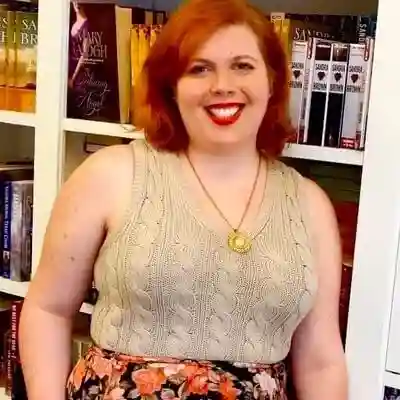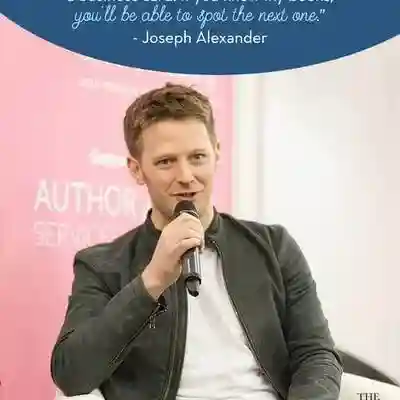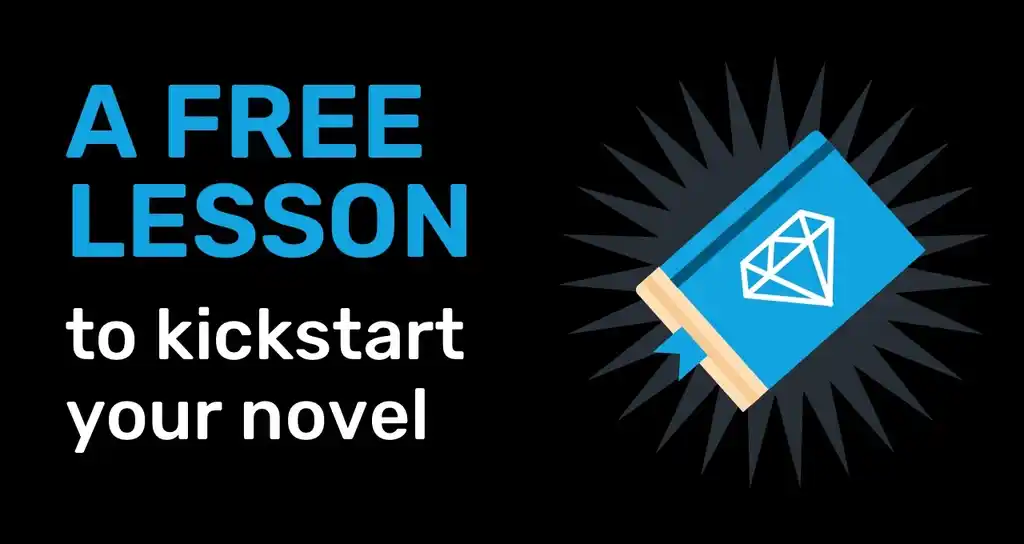Book Marketing: Use Your Existing Skills to Sell More Books
15:00 EST - May 12, 2021
You probably have a lot more ideas and things that you can draw on from your personal life and your existing skillset than you might think. That's what we're going to talk about today.
About me
I'm the author of 20 novels. I write urban fantasy and science fiction, and I've worked with over 20 authors, one-on-one. I run their ads, do marketing, consulting, things like that. I've worked in pretty much every genre, from romance to sci-fi to fantasy to thrillers. That just gives me a lot of insight into what marketing principles are universal and what things are more tactical and only applicable to a certain subgenre.
What we're going to talk about today is really principles-based, which you can apply to fiction and nonfiction as well. I write nonfiction focused on book marketing but it can be applied to your books, regardless of what you write.
A two-minute exercise: finding your strengths
I want you to call, text, or email a close friend, or family member. Someone you trust. It could be a coworker. Ask them for their honest feedback:
- What am I good at?
- What comes to mind when you think of what I'm better at than other people — or what I excel at?
You can frame the question however you want, but the idea is to shine a light on your strengths and existing skillset. Sometimes the things that we're good at (and the things that people recognize us for) are not the same things that we recognize in ourselves.
I've done this with a class of about 100 people or so before and the responses have been interesting there. You get everything from personality traits like “kindness,” which you wouldn't normally maybe consider a marketing strength, but it helps with networking. Then there are things like “analysis.”
My strengths are in analysis with spreadsheets and ads and numbers and things. That's something that I've always been interested in. Then I'd say being contrarian, which is one thing that you may not consider a strength. I want people to think a little bit outside the box. Since I don't approach problems in the same way as other people, it means that my marketing strategy is, by definition, going to be different, which helps me stand out.
You'll also notice that certain strengths can also be weaknesses. So, that can certainly bite me when I don't do something in a straightforward manner that doesn't really require a contrarian take. Right? So, there are pluses and minuses, but it's more about taking out the good that you can than focusing on the negatives.
Let's see what people have to say.
Editor’s note: Over the next few minutes, viewers shared their strengths. Things like “engaging personality,” “my friend thinks I'm funny,” “being authentic and direct with people.” All skills that are potentially valuable to a marketer.
This is a really helpful exercise — and really gratifying as well: to be recognized for things that you might not have thought of yourself. Or to confirm some things that you might think about yourself, but you're not quite sure. So, it's worth doing.
You can use these insights to drive your strategy. Building on that exercise, I’ve found the secret to creating the most effective marketing strategy. It’s not some tactic or technique. Not some “get rich in 30 days” type of thing. The best marketing strategy is the one you can execute. This is so critical
The 80/20 Rule
You have to build a marketing strategy around the resources and the skillset you have. You want to leverage as many existing, natural strengths as you possibly can.
What's the 80/20 rule? This is also known as the Pareto principle: where 20% of your actions generate 80% of the outcomes. That can be higher. Maybe 1% of what you can do will generate 99% of the results.
The numbers here are real: it's a mathematical formula. But don't get too caught up in the numbers: that's not the important takeaway. The principle is a small number of actions produce the majority of your results. So, you want to make sure you're doing these things. That core 20% that generates the 80% will come largely from what you're good at.
The reason for that is that your strengths give you a competitive advantage over other authors. What may seem obvious to you is not obvious to everyone else — and this will be invaluable when you're building your marketing and publishing strategy.
These internal strengths are things like skills that you've learned that aren't common knowledge, or that you pick up faster than other people. You might know how to use WordPress; you might be really good at Excel or Photoshop. There's a ton of different software there and computer skills that fall into that category.
Maybe you do have a marketing background. Obviously, that's an advantage.
You might be an accountant, a financial advisor, or an HR manager. That may not seem like it translates to a solitary pursuit like writing, but that does means that you can organize things. So, you could organize events – whether they're online or in-person – and other things like multi-author box sets or anthologies.
Think about what you've done in the past and how that applies going forward.
We talked about personality traits: being outgoing, kind, funny, reliable, trustworthy. These are all things that can help. No one's going to tick all those boxes, so don't worry if you're not particularly funny. That's not a dealbreaker. But if you don't currently have a ton of skills that you feel are applicable, certainly your personality can be a huge asset and strength. You may not acknowledge these as skills, but you definitely should — because it's something that other people can't replicate. They can't replicate the experience of being you.
You do have to learn new things and hone certain weaknesses. That's just a fact. But you're often going to be better off focusing your time and attention on working on your strengths, figuring out how to use those because you're better at those areas than other people.
As an example, you might be ten times more effective than another author on social media. Maybe your personality tends to be open and inviting. You like trying new social platforms and experimenting with different posting types. Perhaps you're always in Facebook groups or trying out new things like TikTok. That would be an advantage over another person who doesn't like social media at all.
If you don't like social media at all or you're not poking around in the features, then it's very difficult to be good at. It's tough to force yourself to be good at it because you don't have anybody there holding you accountable besides yourself — it's hard to grit your teeth for ten years and drag yourself over the finish line by sheer force of will.
But maybe you're good with spreadsheets or analysis — then you can focus on advertising.
Those are just two of the ways that you can market your book. They’re going to be two of the biggest, which is why I gave them as examples. But really, you should think about what you're interested in and where your strengths lie when you're choosing ways to market your book because you might be ten times — 100 times — better than someone else in that area because of your existing skills, how fast you learn, how interested you are, and your natural personality.
External Strengths
There are external strengths as well, and those are things like:
Finances. Money from a day job or other source, or if your spouse works and you can take some time off, right? Then that's helpful.
Time. If you have uninterrupted blocks of time, or if you're a full-time author, then that's an advantage over someone who might only be able to work at lunch.
Resources. if you have friends, family colleagues who are supportive, or if you know other authors in the community, then that can be a strength as well.
These are what people tend to focus on — and these strengths and resources are important — but your personal strengths are far more critical as these can be replicated. Money is not unique to you; other resources aren't unique to you in terms of having support from family members or anything like that. Your unique skills and personality are one of one. You want to think of how you can build your strategy around that.
Looking inward gives you more of a focus on “what you can do” than if you're looking at this list and you're like, "I don't have a ton of time. I don't know anybody yet; I don't have a ton of money to market my book." It's easy to get discouraged based on that. But if you look at it from a, "Hey, I do have these assets over here," that I can use Excel, or I'm really good at graphic design, or I can network with other authors, well, then that gives you something to build on.
What does a full-time author skillset look like?
When you're marketing, the first thing you want to do is make sure you're tracking your net profit. I would do that on a weekly and monthly basis, but you can do it daily. That's really how you gauge whether your marketing strategy is working.
When I'm building out a strategy, I recommend focusing on three sources of marketing visibility that are driving people to your book page on whatever retailer is published (Amazon, etc.). You will have your author newsletter where people sign up to get updates on your books and things like that — but you want three things in addition to that.
You might be saying, "Hey, three doesn't sound like many," but it's tough to be really good at even three things. By cutting down the list, you can focus on:
- What do I want to do?
- What do I have the resources to do? and
- What am I good at?
So, if you're not good at something and you're not interested in it, you're not going to get better at it. It's just not something that's even really worth considering.
I don't do any social media for the most part. I'm not interested in it. So, it's just not a component of my day-to-day marketing workflow. By going through those, you can really weed out what seems like an endless array of options into something that is very streamlined and focused on what you're good at.
Paid Ads
So, paid ads, that's things like Amazon Ads, Facebook Ads, and BookBub Ads. Those are the big three that authors use.
Promo Sites
Those are promotional newsletters. BookBub is the biggest one. You can check out a list of those on my website. That's a free resource where I list the ones that I've found to be most effective. They’re based on actual numbers, tracking how they did, and those are easy to book. It's another form of paid advertising.
Social media
There's a variety of social media sites. I've kind of cut it down here to what I think would be the most beneficial at this point. You have:
- TikTok (which has exploded over the past six months. If you're really into video, that's something to consider)
- Clubhouse is probably more for nonfiction
- Twitter. Also for nonfiction.
You do see people on Twitter who are fiction authors. I think as a fiction author, you can probably only really get yourself in trouble. You’re unlikely to sell a lot of books there. It's a great tool if you're a nonfiction author to sell various products and establish authority and things like that, so it's a lot more useful if you're writing nonfiction.
I think what happens is that usually, people on Twitter get into Twitter fights and post things that maybe alienate part of their fan base. It can be very divisive. So, I don't recommend it for fiction because you're not likely to sell fiction books via Twitter. You could build a following, but I don't think that the direct correlation to sales is very high or even existent at all. Whereas on Facebook, I've certainly seen authors with large Facebook platforms where these fiction authors use that to sell books where they have a large Facebook group or an engaged Facebook page or engagement on Instagram and they work on that. It translates much more.
Networking
You can run cross-promotions with other authors. You can advertise another author's book in your newsletter, and then you can arrange a swap so that they advertise your book on a given date, things like that. You can organize newsletter swaps where you help build each other's lists by sharing free books and stuff like that. BookFunnel is one of the services that allow you to do that, and StoryOrigin is another.
Obviously, networking also involves social media, and that you can go into groups and form relationships with people. Then they'll invite you to anthology box sets, multi-author collections, stuff like that that you might not otherwise be aware of.
Merchandising
This is retailer promotions on Apple books, Kobo, Nook. Many of these require you to have some sort of rep with a retailer, and that's usually based on how well you're selling. But certainly, if you're good at networking and good at talking with people at conferences and things like that, then that's a way to build that relationship with a potential rep or someone who can get you that merchandising placement.
Content marketing
This is really for nonfiction. I wouldn't recommend these for fiction authors. Within this we have:
- Search engine optimization (SEO)
- Blogging
- Podcasting
- Guest posting (guest appearances, guest podcasting, etc.)
- In-person events.
Right now, in-person events are not so much a thing, but they will come back eventually. You can go to genre-related events and sell books there, meet other authors, meet fans, and that's something that would be potentially effective if you like interacting one-on-one directly with fans.
As I go through this list, you might think "yeah, that sounds great" to some things, and then for other things you might be like, "That sounds terrible. I'm never going to do that."
Narrowing down the list
The biggest error is trying to do everything or feeling like you have to do everything. You have to trial and error a bit initially, testing out things based on your strengths.
Maybe you try a few different paid ad platforms and some social media or some newsletter swaps, things like that, and then you hack away at the list, and you're like, "Okay, here are the things that I really want to focus on getting good at." You want to narrow that fairly quickly because it's just really hard to be great at even just the three things.
You can certainly have a minor presence beyond the core three. This is a question I get a lot: you might be on Facebook and that might be your primary social media platform, but you might have occasional posts on Instagram, Pinterest, TikTok. So, you can certainly do that, but if you're spreading everything out and just not building one to critical mass, then you're not getting the same type of boost. You don't want to have just one thing that's effective because you can run into problems.
Paid ads? The platform may get more expensive or more competitive.
Social media? The rules can change with organic reach. Right now, Tik Tok is exploding, and it's really easy to get organic visibility, but that will probably change in a year. That's been the trajectory for every other social media site. So, you want to have some contingency plans in place, and backups.
Example skillset
This is what I have for my skillset. First my strengths:
I read a lot of nonfiction. So, this is one of those things where you're like, "Hey, man, this might not be really a strength. That seems kind of like it shouldn't be on the list." But most fiction authors read a lot of fiction books. I'm skewed the other way: I read mostly nonfiction. That gives me marketing ideas and analysis processes and things like that that aren't common, so I just approach problems in a much different way, which can give me an advantage when it comes to marketing and certainly helps when I'm writing my nonfiction.
Analysis. Just breaking down the numbers and looking through them and finding what the numbers are actually saying.
Curation and synthesis. I can absorb a lot of information from various sources and then synthesize it together into something that's cohesive and simple and easy to understand — even if you haven't read the books that some of the ideas came from, or if it's drawing an idea from completely separate disciplines. So, if you read my books or my marketing newsletter, you'll find references to things like stock trading or poker. These are things that may not seem all that relevant to book marketing, but that helps me stand out because no one else is talking about that sort of thing and synthesizing it in a way that makes sense.
I already mentioned being contrarian as one of my strengths, but I'll follow this up by saying “don't list your strengths as things you want to be.” Sometimes people say, "I'm contrarian," or, "I'm X, Y, Z," and they're not.
Being contrarian is not something that I chose. There are positives and negatives to that, but certainly, you want to be honest with yourself, because this is only going to affect your career and your outcomes.
Don't make it an ideal list of strengths, make it your actual list of strengths, and know that a lot of them are going to be double-edged swords. It's probably one of the reasons why I'm not on Twitter: it's an instant outlet to get yourself in trouble with contrarian takes.
Fiction Skillset
This is what I do for my fiction books:
- Amazon ads
- BookBub ads
- Promo sites
We have those three, and it doesn't sound like much. It's really hard to master any of the ad platforms. There are a lot of nuances. There's plenty of opportunity to reach readers on Amazon alone, doubled with BookBub. That's a lot of potential ground to cover.
Then minor, complementary sources:
- I have a Facebook page (though it’s not something I really use).
- Cross promotions.
I have done cross-promos in the past to build my email list. I'm not currently doing those. I'm open to doing them if it makes sense and fits in with my strategy. It's really focused on paid ads, and you don't have to do that by any means. In fact, for a lot of authors, I wouldn't necessarily recommend it. The paid ads are sometimes portrayed as a silver bullet but that's just not going to be the experience for a lot of people. You need well-branded books, you need to be writing in a series, usually, and you need to be willing to invest a significant amount of time and probably lose some money upfront — which you can think of as a tuition fee.
Some of you may be saying, "That sounds fine. I'm on board. Sounds like a fit," and others kind of are gritting their teeth at that. That's an early indication of what direction you should take your trial and error process. You can certainly experiment with this, even if you're not comfortable with them. But don't feel compelled to do anything, whether that's social media or paid ads or go to in-person events or anything just because someone else is doing it. There are a lot of ways to find readers.
Nonfiction Skillset
So, with my nonfiction stuff, very simple, I have my:
- Newsletter that I send out kind of on a semi-weekly basis,
- Content marketing: a blog where I post some articles,
- Content marketing: guest appearances, like, say, this class that I'm doing right now.
Then on a lesser level, I occasionally post in author groups. I'm a member of various author groups. That's not really a marketing technique, but certainly, some people find me through that. You could argue that my book — which is on Amazon and other retailers — is a form of marketing that's drawn a lot of people to my site. It’s increased the number of newsletter subscribers I have for the nonfiction side. But that flows naturally from the newsletter.
But you can see that this is really simple. There aren’t a million things going on and I didn't leave out a bunch of stuff that I do, I'm just not sharing it with you. That's really it for nonfiction.
You can see how this flows from my strengths: The newsletter. Focusing on that in nonfiction, I can synthesize various things into a package people can understand. I also test the strategies, so that's where the analysis comes in. Then you have this unique blend where if someone signs up for my newsletter, they're getting content that they can't get anywhere else. Maybe they like it, maybe they don't, but the people who do like it stick around — and that's what any reader base is built on. You need people to keep reading what you've written and keep enjoying it. So, you're looking for your people, the people that are on the same wavelength, and there are a lot of different ways to find them.
For more from Nicholas, sign up for his weekly newsletter and free marketing guides over on his website. He also has a (paid) strategy course that runs you through a similar strengths-based approach to marketing.





